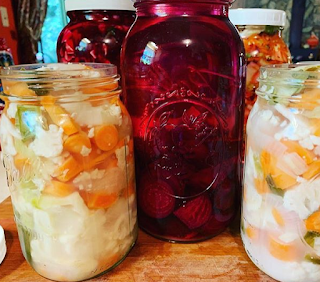Ferment
For veggies, especially cabbage, beets, turnips, mustards, carrots, etc. ferment them! What all you need is a jar, salt and some filtered water. If you like pickles and sauerkraut then you'll enjoy the tangy flavor of fermented veggies, plus the many health benefits including natural probiotics. Here are some of the basics on fermenting.
Freeze
Most veggies- such as broccoli, cauliflower and greens like collards and kale do well if you chop em and freeze them for use at a later time. Frozen broccoli, cauliflower and collards can be steamed or boiled at any point and easily thrown into a meal. Broccoli, cauliflower and kale also make great additions to smoothies believe it or not-- mix with enough sweet fruit and you won't even taste them, but their fiber, chlorophyll and nutrients will add a lot to balancing out your smoothie to give you all the nutrients you need. Fruits are great for smoothies too and if you freeze them at their peak ripeness you can use them at a later time to sweeten up and flavor the perfect smoothie. My favorite fruits for smoothies are bananas, berries and mangoes, but you can literally use anything- even avocados! Just make sure you peel, chop, and remove any pits prior to freezing, and divide them up into ziplocks for easy storage. Fruits like mangoes and grapes are really delicious to snack on frozen- so freeze these while ripe (chop the mango into bite-sized pieces first) and then they'll stay good much longer in the freezer than in the fridge.
Juice
Right now I'm on a juicing craze. It happens to me every spring right after I've been fermenting veggies for a few months... I utilize the leftover vegetables that have been accruing and going soft in the fridge into a nice fresh JUICE. Juicing has so many benefits including you being able to utilize so many nutrients from a ton of fruits and veggies that you wouldn't otherwise be able to eat in one meal. For example- you can get loads of vitamins from 20 carrots in a jar of juice that you definitely couldn't eat in one sitting. You will need a juicer in order to juice produce, but you can find one for cheap at your local thrift shop (just wash thoroughly before use). My first ever and still going strong juicer I got for $5 at a yard sale 5 years ago. I bought another better and bigger one at a thrift store recently in anticipation for this one to die but it hasn't kicked the bucket yet!
Prior to juicing, make sure produce is rinsed, cleaned, and mold free. If I have a piece of a moldy apple or veggie I chop off that part and juice the rest. Some of my favorite produce to juice includes: carrots, apples, beets, broccoli stems, wheatgrass, ginger root, garlic bulbs, turmeric, and kale. I've also juiced berries and watermelon when I have an excess. If you juice beets only put a small amount per serving though or you can get sick from them. I use one small beet per 10 carrots or so. Beets add a really beautiful hue to any juice but they are really really strong and can upset your stomach if the beet juice isn't diluted. Apples add sweetness to any veggie juice, ginger will give your juice a zesty kick (so only use a small piece of root per serving), turmeric is strong but has so many incredible health benefits and in moderation adds some nice earth undertones to a juice. Garlic is also strong but is a great immunity booster if you're sick or trying to avoid getting sick. It also fights infections really well. Greens are fabulous juiced but taste best when balanced with the sweetness of carrots and apples. Citrus juice can be added too but these juice best squeezed by hand or in a citrus juicer.
Plant
Lots of scraps/ends/cuttings/seeds from your unwanted produce can actually be planted to grow into a new plant! Check this out for inspiration.
Compost
Well-- if your produce failed to meet the requirements for any of the above options or if it's just too far gone, composting is your best option. Compost in a bucket, pile, or jar and once it breaks down you can add it to your garden for extra nutrients for your plants. Throwing compostable produce into the garbage means it will break down and decompose in a garbage bag in a landfill somewhere, get contaminated, and those nutrients will never be able to be utilized by the earth. Composting is great for your garden and the environment! Best way to make use of rotten produce :)



No comments:
Post a Comment